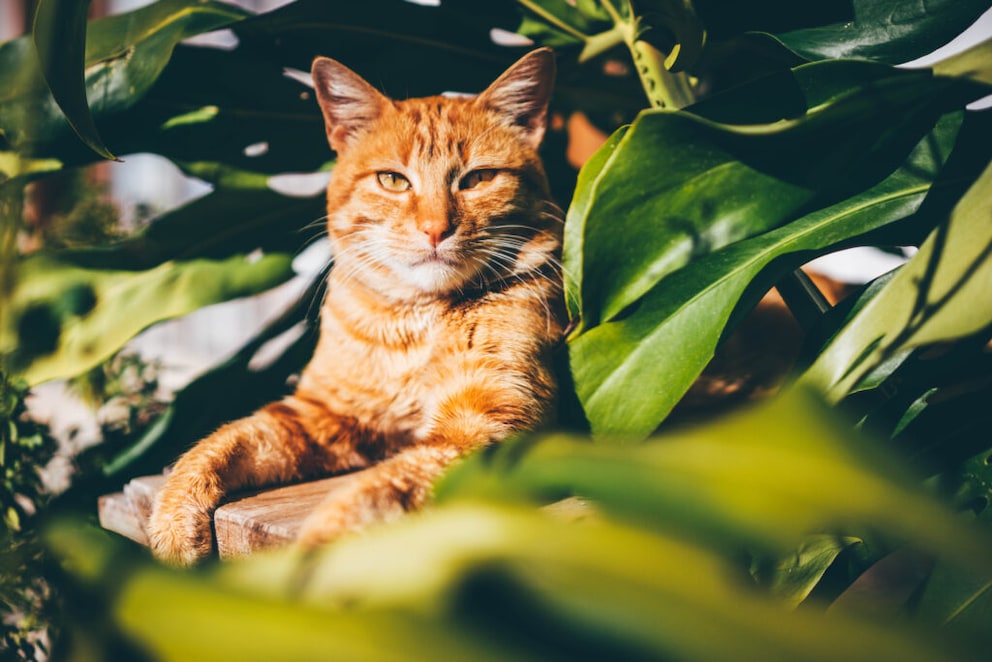July 28, 2024, 5:46 pm | Read time: 4 minutes
Of the almost 16 million cats living in German households, many are allowed outside. On their forays through the neighborhood, outdoor cats often enter other people’s properties, but not everyone is happy about this visit. PETBOOK explains how you can keep cats out of your garden in an animal-friendly way.
Many cat owners let their pets have free rein. However, it becomes clear that this is not just limited to your own garden when you realize how large a cat’s territory is on average. According to the Tierärztliche Vereinigung für Tierschutz e. V. (Veterinary Association for Animal Protection) female cats claim about half a hectare (1.23 acres) as their territory, and male cats claim even three to four times that size. It’s therefore not surprising that outdoor cats venture beyond the neighbor’s garden. Not everyone is happy about this visit. Even those who love animals aren’t exactly thrilled to constantly find smelly droppings in their flower beds. Cats can also pose certain risks, such as to household dogs, other cats, or small children. PETBOOK has compiled tips on how to keep cats out of your garden in an animal-friendly manner.
Why does the neighboring cat always come to us?
Cats are indifferent to property boundaries and ownership. That’s why outdoor cats simply roam around wherever they like. They hop over the garden fence or squeeze through the hedge to get into the neighbors’ gardens. In fact, this behavior is typically permitted. Generally, cats are permitted to wander through others’ gardens, even leaving behind droppings, urine, and vomit.
So legally speaking, there is little you can do about it if the neighbor’s cat regularly drops by. The situation changes, however, if the cat enters your home and either does its business or causes damage. In this case, you can take legal action against the nuisance.
How can I keep cats out of my garden in an animal-friendly way?
There are many good reasons for wanting to keep cats out of your garden. Perhaps you have a cat yourself and want to prevent territorial disputes between the animals. Or your dog regularly romps across the lawn and needs to be protected from the sharp claws of the neighboring cat. Outdoor cats can also threaten ornamental and wild birds, as well as fish in garden ponds, leading some animal lovers to prefer keeping them off their property.

Many cats don’t like lemon balm and lavender
There are several ways to chase cats away in an animal-friendly and permanent way. For example, you can plant certain plants that smell unpleasant to cats. These include lavender, lemon balm, cranesbill, and the colloquially named ‘scat’ plant. They are all non-toxic for people and cats, but they give off an aroma that is unpleasant to sensitive cat noses.1
Protect beds and sandpits
A particular problem is the droppings that cats like to leave behind in flower beds and sandpits. They tend to bury their waste in the soft soil or sand, leading to unpleasant odors. In addition, cat excrement can contain pathogens that can be particularly dangerous for pregnant women and small children. So, how can you deter these uninvited guests?
Sandpits should always be covered with a net, tarpaulin, or lid when children are not playing in them. Freshly planted beds can also be covered, for example, with fleece. If the plants are already somewhat taller, rustling strips of aluminum foil on branches or fences can ensure that cats take flight. Scattering coffee grounds is another proven method: this non-toxic substance not only deters cats from the beds but also serves as plant fertilizer. 2 3

Often Underestimated: These Dangers Await Cats in the Garden

How to cat-proof your balcony and keep it varied

Which Early Bloomers Are Poisonous to Cats and Dogs?
Drive cats away with water
A highly effective method for keeping cats out of the garden is the use of an animal repeller. These are devices that shoot a jet of water up to 10 meters (32.8 feet) and are activated by movement. While this might seem somewhat extreme initially, it effectively ensures that unfamiliar cats will steer clear of the area going forward. Similar devices are also available with compressed air, ultrasound, or odors, which are designed to deter cats. 4
Admittedly, this can stress the cat and cause it significant alarm. However, a cat visit to your own pets in the house can also lead to stress and resentment. Some animals even start to mark the house because they are unsettled by the strange cat in the garden. In the worst-case scenario, this could result in redirected aggression. This means that your own cat starts to attack its owners or fellow cats when it sees the neighboring cat in the garden. It’s crucial to address the problem swiftly.
Important: Should you opt for a motion-activated water jet to deter cats or other animals from the garden, ensure it’s only used when your own cat isn’t present.

